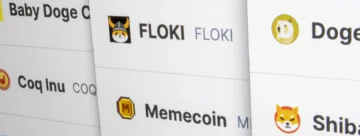How Do Blockchain Domains Work, and What Do They Offer?

What Is a Blockchain Domain?

A blockchain domain is a decentralized domain address that functions based on distributed ledger technology. Instead of using traditional centralized systems such as ICANN, blockchain domains operate using decentralized networks.
Blockchain transforms domain names into digital assets that can be transferred, sold, or inherited without intermediaries. Blockchain domains also provide improved security, privacy, and resistance to censorship.
For example, they’re used to replace public crypto addresses, which are combinations of 20 characters or more, with simpler “names,” such as cp-media.eth. This allows cryptocurrency transactions to be made without using standard addresses but with specific domain names owned by companies or individuals, minimizing the risk of errors.
Decentralized domains are available on the largest blockchain networks like Bitcoin and Ethereum and several others: Handshake, EOS, Waves, Blockstack, and others. Over two dozen cryptocurrency wallets already support blockchain domains, including the most popular ones: MetaMask, Trust Wallet, Atomic Wallet, Opera Wallet, Coinomi, MyEtherWallet, etc.
The blockchain domain market is quite young, but the Ethereum blockchain network alone has more than 2.7 million decentralized domain names registered as of April 9, 2023.
Key Advantages of Blockchain Domains

The use of blockchain domain technology offers a host of important advantages over conventional domains:
- Resistance to censorship. Due to their decentralized structure, blockchain domains are more difficult to block or censor, ensuring freedom of information.
- Improved security and privacy. Blockchain domains are protected by cryptography and controlled with private keys, making them more secure and private.
- Easier cryptocurrency transactions. As mentioned, blockchain domains allow users to replace complex cryptocurrency addresses with easy-to-remember names, simplifying the process of sending and receiving cryptocurrencies.
- Decentralized management. The owner of the blockchain domain has full control over their domain name without depending on centralized registrars, which reduces the risks associated with hacker attacks, regulatory pressure, and censorship.
- Investment appeal. Blockchain domains are digital assets that can be transferred, sold, and inherited, creating opportunities for domain investment and speculation.
Furthermore, blockchain domains are usually provided to users without annual renewal fees, distinguishing them from traditional domain names. However, this doesn’t mean the blockchain domain is “bought forever” in an absolute sense. Ownership of the domain name will continue as long as the private key with which the domain was registered remains under control.
However, depending on the specific service, extra conditions may affect the length of ownership of the blockchain domain. So it’s always recommended to check the terms and conditions of purchasing domains from a particular registrar.
The Use of Blockchain Domains

In addition to crypto transfers, blockchain domains can be used for the following purposes:
- Developing decentralized apps (dApps). Blockchain domains facilitate interaction with smart contracts and dApps content, providing decentralized control and management capabilities.
- Creating decentralized websites. Blockchain domains provide censorship resistance and high security for decentralized websites by protecting content and user identities through cryptography.
- Protecting trademarks and intellectual property. Blockchain domains can be used to register and protect trademarks and other intellectual property rights in a decentralized environment.
- Domain investment and speculation. Blockchain domains can be used for investment and speculation in the domain name market because they’re digital assets that can be transferred, sold, and acquired.
Top Blockchain Domain Platforms

Nowadays, there are already a fair number of platforms providing blockchain domains to individuals or large crypto investors. Let’s take a look at the most popular platforms.
Unstoppable Domains
The Unstoppable Domains protocol allows you to work with .blockchain, .bitcoin, .crypto, .coin, .nft, and other domain zones. The number of domains registered on the platform currently exceeds 3.4 million and has over 788 integrations with browsers, crypto wallets, and dApps. The price of a domain starts at $5 and depends on the number of characters in the name.
Ethereum Name Service
Ethereum Name Service (ENS) works with the .eth domain zone. The network includes over 2.7 million domains with 535 integrations. The minimum registration fee is $5, $160, or $640 for five or more, four, and three characters in the name, respectively.
The ability to import DNS (support for .com, .app, .art, .org, .io, and .xyz zones) should be mentioned. In addition, ENS users can set up an NFT avatar in their profile.
Handshake
The Handshake platform supports .1, .247, .3dom, .80proof, .api, .articles, etc. The system provides authorization options, auctioning, and payment in HNS. Presented domains can be purchased on this platform and some other services.
Other Popular Platforms for Blockchain Domain Registration
Other popular platforms for buying blockchain domains include:
- Dotsama Domains (.polkadot, .ksm, .sub, .wagmi);
- Polkadot Name Service (.dot);
- Evmos Domains (.evmos);
- REKT (.rekt);
- Avalanche (.avax);
- Tezos (.tez);
- Flow (.fn);
- Solana (.sol);
- Ada (.ada, .surf);
- Celo (.nom), etc.
Potential Challenges and Limitations

Blockchain domains provide many key benefits to all crypto market participants, but there are also potential problems and limitations associated with their use:
- Limited interoperability. Most traditional browsers and apps don’t support blockchain domains by default, making it difficult to access decentralized websites and apps. Users often have to use specialized plug-ins or browsers.
- Complexity of the technology. Blockchain technology can be difficult to understand and use, especially for newcomers. This can create challenges in managing domains and developing decentralized apps.
- Speed and scalability. Blockchain networks can face speed and scalability limits, which can impact the performance and stability of decentralized websites and apps.
- Legal and regulatory issues. Depending on the jurisdiction, governments and regulators may restrict or prohibit the use of blockchain domains. This can cause legal uncertainty for domain owners, developers, and businesses.
- Security concerns. Scammers regularly perfect social engineering attacks aimed at controlling private keys, and hackers are constantly on the lookout for crypto-related vulnerabilities.
- Lack of centralized support. Unlike traditional domain names, blockchain domains have no centralized registrars, which limits access to technical support and solving user problems.
- Adaptation and implementation. Although blockchain domains offer innovative capabilities, their widespread adoption can take quite a long time as they compete with the established infrastructure of traditional domain names.
Currently, blockchain domains are at an early stage of development. It’s still a relatively small market, however, the technology is actively gaining popularity, especially among people who value privacy, work in blockchain technology, and are simply interested in crypto. Thus, we should expect its further development and more widespread adoption in the foreseeable future.











